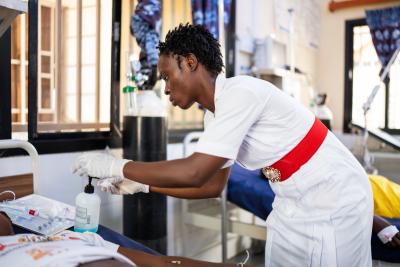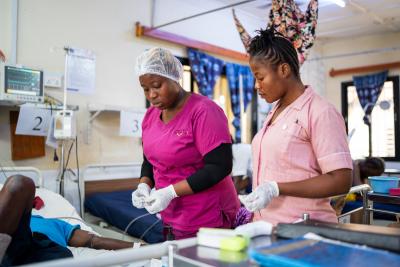When Isata Sia Baningo traveled from Freetown to Kono district to seek medical care, she arrived at PIH-supported Koidu Government Hospital (KGH) in a critical condition. “She was extremely thin, unable to speak, and visibly restless and confused,” recalls Hawa Kpovowai, an emergency nurse who was part of the team that treated her.
Isata’s recovery was anything but linear. Periods of improvement were followed by setbacks. Clinicians worked tirelessly to conduct various diagnostic tests, adjust her medications, and explore multiple therapies in an effort to stabilize her. Isata spent 18 days under continuous supervision and care in the emergency department before transitioning to the general ward to continue her recovery.
Why Early Diagnosis Matters
Isata’s illness crept in slowly. “I lost my appetite, felt pain all over my body, and grew weaker with each passing day,” she explains. It was a phone call from her mother, who lives in Kono, that ultimately convinced her to travel for treatment. “When I told her what was happening, she became really worried and insisted I come to Kono to get proper care. When I arrived, I was admitted immediately and placed on oxygen,” she notes.
Isata’s severe respiratory distress was diagnosed dangerously late through no fault of her own. Before arriving in Kono, she had sought treatment at a hospital in Freetown, where she was prescribed some medication prior to receiving a diagnosis.
“This really highlights the problem at the diagnostic stage,” says Denis Senesi, a Community Health Officer (CHO) who followed Isata’s case. “This is a preventable condition that disproportionately affects the most vulnerable. Strengthening diagnostic systems improves survival because the earlier a condition is identified, the better the prognosis for the patient.”
At KGH, clinicians have access to rapid diagnostic tools and chest X-rays, and technology to detect respiratory infections which makes timely diagnosis and intervention possible.
Beyond diagnostic tools, the emergency room has the equipment to support the care of critically ill patients, including vital sign monitors, wall-mounted cardiac monitors, an EKG machine, ultrasound systems, essential pharmaceuticals, IV syringe and infusion pumps.

Nurse Hawa Kpovowai tends to a patient in the emergency department at Koidu Government Hospital.
Lahai Khumala / PIH
Addressing Social Needs
A key priority for the clinical team was addressing the social determinants that shaped Isata’s illness and recovery. One of the most immediate interventions was lifting the financial burden of care, an enormous relief for her.
“Money could have been a big problem, especially after all the time she spent in the emergency room,” explains Hawa. “The tests and medications were free. She didn’t go a single minute without oxygen,” she adds.
In addition to medical treatment, Isata received consistent social support including free meals, which was essential during her recovery. “She came all the way from Freetown and was taking strong medications,” says Denis. “If you have to take them in the morning, you need food in your stomach,” he emphasizes.
Treating the Whole Patient
In emergency care, the importance of team work cannot be overstated. These complex situations demand a holistic approach that involves community health workers (CHWs), clinicians, nurses, and patients’ own families.
Treatment regimens can be intensive, making consistent support essential for adherence and long-term recovery. “When necessary, we involve the mental health team to support patients who are struggling to adhere to their medication,” explains Denis. “We also make sure CHWs and CHOs follow up regularly, ensuring patients attend their appointments and stay on track.”
Like Isata, more patients are making trips from various parts of Sierra Leone to get treatment at KGH. “Having lived in both Freetown and Kono, I have seen how health care differs in these places. Going through this myself has made me really appreciate the importance of receiving care quickly and easily when you need it,” highlights Isata.

Nurse Elizabeth Kambaima (left) provides care in the emergency department of Koidu Government Hospital alongside Magareth Bonga (right), a dedicated nurse in training.
Lahai Khumala / PIH



